National Platforms for Adaptation & Resilience (Part 2)
Welcome to the second instalment of Cadlas’ new insight blog series, Resilience Unpacked, where we explore key topics in climate resilience financing. In this edition, we focus on National Platforms for Adaptation and Resilience Investment.
National platforms or country platforms for climate action are country-led partnerships that align financing, coordinate stakeholders and connect national climate policies with financeable projects. They enhance collaboration, streamline funding and maximise climate impact by bridging the gap high-level national adaptation plans and financeable investments.
As demand for adaptation finance grows globally, national platforms are increasingly identified as important mechanisms for mobilising investment in climate adaptation and resilience initiatives. Strengthening and expanding these platforms will be key to transforming national climate policy ambitions into investable projects and unlocking the full potential of climate resilience investments for a more resilient future.
In Part 1 of our Resilience Unpacked series on national platforms, we explored exactly what they are and how they function. Now, we’ll take a closer look at their structure, organisation and the key stakeholders driving their work. Click here to read part 1 of this series
Structure of National Platforms for Adaptation & Resilience
As explored in Part 1, national platforms for climate action integrate climate considerations into investment pipelines by embedding them into strategy, operations and decision-making processes.
While there is no universal model, these platforms typically achieve their objectives by consolidating national climate priorities, supporting project preparation and capacity building, enhancing project pipeline management and mobilising innovative financial instruments.
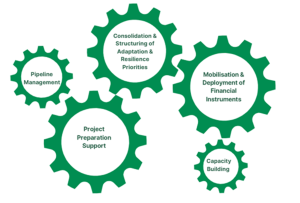
A defining characteristic of national platforms is that they are country-driven, meaning their structure varies based on national context. Despite differences in governance and institutional setup, these platforms generally engage a diverse set of stakeholders, including government entities, the private sector, civil society (including academia), and, in many cases, international organisations.
Stakeholder Roles in National Platforms
Stakeholders within national platforms work together to set the platform’s strategic direction, align investments with national adaptation priorities, mobilise funding, and develop investable adaptation project pipelines.
They also build institutional capacity, manage risks, coordinate community engagement to ensure local adaptation needs are met, and streamline funding between national governments and international financial institutions. These stakeholders generally fall into two main categories: leading and supporting stakeholders.
Leading Stakeholders
- Leading stakeholders play a key role in integrating national adaptation priorities into investment planning and financial supervision.
Supporting Stakeholders
- Supporting stakeholders help incorporate adaptation into sectoral investment planning and align community-level adaptation goals with national priorities.
- Depending on the institutional context, there may be other supporting stakeholders which contribute by managing risk and data, aligning projects with finance priorities, coordinating international funding, providing climate risk modelling, and promoting equity in adaptation efforts.
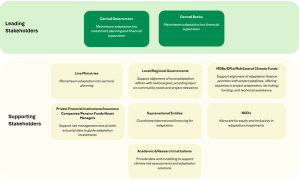
National Platforms in Action: Examples from Around the World
While national platforms have been widely used to support climate mitigation efforts, not many examples exist of their application in scaling up finance specifically for adaptation and resilience. However, international support for adaptation-focused national platforms is growing, with a consortium of MDBs publishing guiding principles for their development and implementation.
Key initiatives driving this momentum include the:
- Asian Development Bank’s (ADB) Climate Adaptation Investment Planning (CAIP) , which helps ADB partner countries translate national adaptation priorities into robust investment programmes by leveraging existing structures and strategies.
- International Monetary Fund’s (IMF) Resilience and Sustainability Facility (RSF ), which provides long-term financing to help countries strengthen economic resilience to climate risks.
As mentioned previously, the structure of a national platform varies based on country-specific needs and governance models. The following examples illustrate these differences, showcasing distinct stakeholder roles and levels of involvement.
The Netherlands Sustainable Finance Platform
Chaired by the De Nederlandsche Bank (DNB), the Netherlands’ Sustainable Finance Platform (SFP) is a great example of a financial sector driven national platform. The SFP brings together stakeholders across the financial sector including asset managers, the Dutch Banking Association, insurers and pension funds to work with government ministries to promote sustainability in the Netherlands through its financial sector.
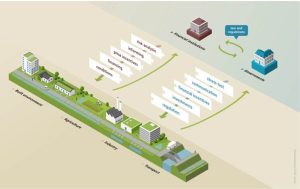
A core feature of this platform is its working groups, which shape the platform’s thematic focus. Importantly, the SFP features an Adaptation Working Group which examines how the financial sector can support economic adaptation to climate change in four key sectors: built environment, agriculture, industry and transport. The group assesses scenarios, methods, and data required for financial institutions to evaluate climate risks and adaptation needs. While its outcomes are non-binding, its recommendations play an important role in strengthening collaboration between financial institutions, the government, and other stakeholders, ensuring that adaptation challenges are linked to financial sector actions.
The Bangladesh Climate and Development Platform
Bangladesh is among the most climate-vulnerable nations, making climate adaptation finance an urgent priority. Launched in 2023, the Bangladesh Climate and Development Platform (BCDP) is a government-led initiative established in collaboration with international financial institutions, bilateral donors, and the private sector. While not exclusively focused on adaptation and resilience, the platform aims to generate a robust pipeline of climate projects and financing strategies.
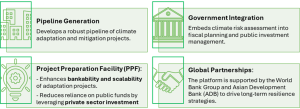
Building upon financing from long-term international development financing partners and an arrangement with the IMF’s Resilience and Sustainability Facility, the BCDP aims to improve the integration of climate risks into fiscal planning, enhance climate-sensitive public investment management and strengthen climate-related risk management for financial institutions. Under the BCDP, a project preparation facility will also be established to enhance project bankability, making climate projects more scalable and attractive to private investment.
The Way Forward for National Platforms for Adaptation & Resilience
By streamlining stakeholder collaboration, national platforms have become important mechanisms for mobilising finance for adaptation & resilience. The examples of the Netherlands and Bangladesh highlight how platforms can be tailored to meet country-specific needs to build resilience to the growing challenges of climate change.
As the demand for adaptation finance continues to rise, the success of these platforms will depend on strong, inclusive partnerships and a clear focus on locally led solutions.
This concludes our Resilience Unpacked series on National Platforms for Adaptation & Resilience. Thank you for joining us on this deep dive into national platforms and stay tuned for more from the Resilience Unpacked blogs series!
Other Articles

Cadlas Newsletter: January 2025 Issue
Welcome to the Cadlas Newsletter!
Welcome to the second edition of the Cadlas Quarterly Newsletter! Each edition will provide valuable insights into the latest trends and developments in climate resilience finance, covering topics such as sustainable bonds, climate resilience taxonomies, and more. This newsletter is also an excellent way to stay up-to-date on the Cadlas team and our work!

Global Environment Facility’s (GEF) Climate Adaptation Innovation & Learning Project Launch
In vulnerable developing countries, private investment in climate adaptation falls short of needs due to barriers like limited climate data, unclear impact metrics, and a lack of collaborative frameworks. The Climate Adaptation Innovation Learning (CAIL) project tackles these issues by fostering innovation and private sector engagement, connecting financial stakeholders in climate-vulnerable regions through three Communities of Practice (CoP).
Cadlas is pleased to serve as the technical partner for the Climate Change Adaptation Information Flows & Impact Measurement CoP, which focuses on consolidating and enhancing the understanding and use of climate-related information flows, empowering the financial sector to make scalable, impactful adaptation investments.
CAIL is financed by the Global Environment Facility and implemented by the UNIDO in partnership with Climate-KIC, Global Adaptation & Resilience Investment Working Group (GARI) and United Nations Environment Programme Finance Initiative (UNEP FI).

Cadlas is especially proud to see Barbados at the forefront of implementing innovative climate finance solutions for climate resilience such as the world’s first debt-for-climate swap. Supported by the Inter-American Development Bank, the European Investment Bank and commercial banks, this transaction swaps Barbados’ sovereign debt for more affordable financing, unlocking $125 million in fiscal savings which will be used to enhance water security and climate resilience.
Cadlas has previously collaborated with the Inter-American Development Bank on sustainability-linked sovereign debt instruments. This explored how sovereign debt management can be aligned with national climate resilience priorities and outlined a model for climate resilience performance measurement and target-setting. We are thrilled to see these ideas in action, paving the way for other climate-vulnerable nations to enhance resilience.

The financial sector is increasingly recognizing the emerging opportunities tied to climate adaptation and resilience. While progress has been made in improving the level of private sector investment, much more is needed to create the enabling conditions for a thriving adaptation and resilience market.
Cadlas is proud to have contributed to the development of the ‘Call for Collaboration’ recommendations, formulated during roundtable discussions hosted by the Atlantic Council’s Climate Resilience Center and the High-Level Climate Champions with public and private sector stakeholders. These recommendations outline six key actions to create enabling environments for mobilizing private finance for adaptation and resilience.

The potential for sustainable bonds to support the scaling up of financing for climate resilience took a major step forward in November, when the state of California approved a proposition for a USD 10 billion bond issuance to raise finance for responding to the impacts of climate change. These funds will be used to raise finance for investments that build resilience to a range of climate change impacts that California faces – many of which were brought into sharp focus through the devasting wildfires that destroyed thousands of homes in the Los Angeles area during January 2025.
While the bulk of the funds (USD 3.8 billion) will go towards water sector investments such as improving water quality, coping with floods and droughts, and the restoration of freshwater bodies such as rivers and lakes, a number of other climate resilience priorities are also covered. These include allocations of USD 1.95 billion for coping with wildfires and extreme heat, USD 1.9 billion for protecting natural habitats and wildlife, and USD 1.2 billion for coastal and marine protection, as well as funding for clean energy and agricultural projects.
From the Insights Blog:

Introducing Resilience Unpacked, Cadlas’ insight blog series providing an in-depth exploration of key topics in climate resilience financing. This first instalment will focus on national platforms and their role in mobilising finance for climate resilience.
National platforms for climate action are increasingly being recognised as important mechanisms for advancing national climate adaptation goals. These government-led partnerships foster collaboration among development partners and other stakeholders, aligning efforts with a shared strategic vision and national priorities. These platforms are essential for mobilising and directing finance towards investments that align with national adaptation and resilience priorities, fostering both focus and a sense of ownership over these priorities.
Read more here to learn how these platforms can help to mobilise finance for adaptation by bridging the gap between high-level national adaptation plans and financeable investments.
Cadlas in the News:

Responsible Investor: Adapting to the New Climate Realities
In a recent interview with Responsible Investor, Cadlas CEO Craig Davies highlighted the importance of clear, widely recognised definitions of adaptation and resilience, such as those outlined in the Climate Bonds Resilience Taxonomy (CBRT), in attracting private investment to the space. By specifying what qualifies as an adaptation activity, the CBRT seeks to empower bond issuers to design innovative financial instruments that inspire investor confidence. Davies also expressed his optimism that the CBRT would play a pivotal role in boosting private sector engagement in financing climate adaptation and resilience initiatives.

Check Out Our New Website
We’re excited to announce that our website has a brand new look! Check it out here!
National Platforms for Adaptation & Resilience (Part 1)
Welcome to the first instalment of Cadlas’ new insight blog series, Resilience Unpacked, where we explore key topics in climate resilience financing. In this edition, we focus on National Platforms for Adaptation and Resilience Investment.
We’ll explore how these platforms can serve as crucial mechanisms for financing climate adaptation and resilience initiatives. Specifically, we’ll define what they are and examine how they function, while highlighting the key role they can play in mobilising finance for adaptation and resilience.
What Are National Platforms and Why Do They Matter for Adaptation & Resilience?
National Platforms for climate action, or more commonly called country platforms, are government-led partnerships that bring together multiple stakeholders including the private sector and development finance partners to coordinate efforts, align financing and support national priorities. They act as investment coordination hubs, connecting national climate policies with financeable projects by fostering collaboration, streamlining funding and enhancing the impact of climate-focused development initiatives.
Mobilising Finance for Adaptation & Resilience
Regarded as key coordination mechanisms, national platforms have begun to play an increasingly vital role in advancing national climate goals. Their significance was underscored in the United Nations Framework Convention on Climate Change’s (UNFCCC) 2023 Global Stocktake, where they were highlighted as instrumental in facilitating the implementation of the third round of Nationally Determined Contributions (NDCs). But how do they relate to adaptation and resilience?
While many of these platforms focus primarily on climate mitigation, such as the International Partners Group (IPG) supported Just Energy Transition Partnership (JETP), national platforms also have the potential to play a crucial role in scaling up and mobilising finance for adaptation and resilience. They can offer focus and ownership over national and local adaptation priorities and coordinate investment efforts by bridging the gap between high-level adaptation strategies, like National Adaptation Plans (NAPs), and financeable investments.
The diagram below illustrates how national platforms can utilise country-level strategies to align financial flows with adaptation needs:

Mainstreaming Adaptation & Resilience Across the Investment Pipeline
National platforms mainstream adaptation and resilience considerations across the investment pipeline by integrating it into their strategy, operations, and decision-making processes. They achieve this via three key functions: Strategic Planning & Policy Integration, Investment Structuring & Financial Alignment, and Enabling Environments & Capacity Building.
The diagram below illustrates how national platforms function by integrating and mainstreaming adaptation and resilience considerations across the investment pipeline:
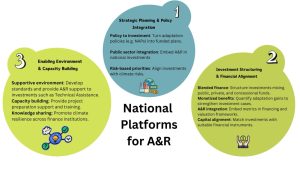
Strategic Planning & Policy Integration
National platforms play a vital role in turning national adaptation policies into investable plans and mobilising the necessary domestic and international resources. They create opportunities for government bodies, such as finance ministries, to collaborate with key stakeholders, ensuring adaptation and resilience are embedded into public investment programmes. By translating physical climate risks into investment priorities, they help develop pipelines that align with the risk-return expectations of financiers, making adaptation a more attractive and viable investment.
Investment Structuring & Financial Alignment
National platforms support the structuring of investment programmes that blend public, private and concessional finance to crowd-in commercial capital and ensure that investments meet investor requirements. They also help capture and monetise the full range of adaptation benefits including avoided losses, enhanced resilience and broader sustainable development benefits, strengthening the business case for investment. They also facilitate the integration of adaptation and resilience metrics into investment appraisal frameworks, ensuring that projects can be matched with the right financial instruments and capital types, making it easier to mainstream adaptation into investment decisions.
Enabling Environment & Capacity Building
Beyond finance, national platforms help establish the necessary, enabling environment for adaptation investment through facilitating technical assistance, promoting the development of metrics/standards and promoting the integration of adaptation and resilience into financial supervision. They also play a key role in supporting project preparation, building institutional capacity and fostering knowledge sharing across the financial sector.
Looking Ahead – Strengthening National Platforms for Climate-Resilient Growth
In conclusion, national platforms have the potential to be powerful drivers of adaptation and resilience finance, turning policy ambitions into investable projects.
By integrating adaptation and resilience considerations across the investment pipeline, they foster collaboration, align financial flows and embed adaptation and resilience into national investment decision-making. As the need for adaptation finance continues to rise, strengthening and expanding these platforms will be key to unlocking the full potential of climate resilience investments and building a more climate-resilient future.
To scale climate adaptation finance, national platforms must:
- Expand beyond being primarily mitigation-focused and fully integrate adaptation & resilience
- Align financial flows with adaptation goals for long-term climate security
- Strengthen cross-sector collaboration to foster holistic adaptation strategies
By providing a holistic overview of key stakeholders’ inputs and country needs, national platforms help direct financial flows and facilitate partnerships.
In part 2 of this Resilience Unpacked series on National Platforms, we’ll dive deeper into how National Platforms are structured and organised, and the various kinds of stakeholders that are involved. Stay tuned!
Other Articles

Internship: Climate Resilience Financing (2025 Update)
Internship: Climate Resilience Financing

About Cadlas
Cadlas is a dynamic start-up advisory practice focused on the rapidly expanding field of climate resilience financing. Our mission is to help build a climate resilient future, by helping capital to flow towards activities, assets and technologies that build resilience to the impacts of a changing and more variable climate.
We advise businesses, financial institutions, investors, markets, regulators, policymakers and international organisations on climate resilience analytics, definitions and mechanisms, on climate resilience impact and strategy, and on the evolving regulatory landscape. Our work ranges from bond markets and impact investing, to investment strategy and financial supervision, and beyond.
Climate resilience (or adaptation) financing is vitally important and yet currently under-developed area of sustainable finance. At Cadlas we focus on impactful, practical, and market-relevant approaches to problem-solving and innovation in this area.
About The Role
This is a unique and outstanding opportunity for a recent graduate candidate looking for an entry-point and exposure to the field of climate resilience & adaptation financing.
• You’ll have a passion for climate resilience, climate action and sustainability, and a solid understanding of climate change impacts and their significance for economic activity and financial markets.
• You’ll be comfortable working in a dynamic, fast-paced environment with the ability to deliver work to tight timelines.
• You’ll be resourceful, a quick learner with a good eye for detail, able to take initiative and work both independently and as part of a team and have excellent communication skills.
• You’ll be hardworking and committed to delivering work to a high standard.
You will work in a small and dedicated team that leads on innovative approaches to scaling up the quantity and quality of climate resilience & adaptation financing, working alongside a broad range of stakeholders across the climate science community and the financial sector. This is a unique opportunity to be involved in projects that have a significant impact on how private finance is mobilised towards climate resilience & adaptation internationally. You will also have the opportunity to build your network in a specialised and technical area of climate finance.
What You'll Be Doing
As an intern at our company, you will gain valuable hands-on experience over six months supporting client projects and research. Key responsibilities include:
• Conducting research and analysis on climate physical risk and resilience/adaptation topics to inform our work. This may include:
• Researching integration of climate resilience & adaptation criteria and objectives into target-setting and investment decisions in the financial industry, particularly in the context of the climate strategies of private financial institutions.
• Synthesizing lessons from development finance on effective mobilization of climate resilience & adaptation finance in lower-income countries, including useful case-studies that illustrate them.
• Analysing gaps and opportunities for multilateral banks and climate funds to increase support for climate resilience & adaptation finance.
• Tracking approaches to physical climate risk integration into climate resilience & adaptation planning at different market levels and sectors.
• Assisting with report writing and presentation development
• Gathering and organizing new data in spreadsheets and databases, including creation of data visualizations and summaries where relevant
• Learning about our consulting processes and methodologies, and how they can vary dynamically across our clients
• Thinking creatively about solutions to climate resilience & adaptation finance problems and brainstorming with the team where opportunities arise.
This internship will provide you with practical experience in sustainability consulting and the opportunity to apply your academic knowledge, collaborating with members of our team.
What You'll Bring
• Passion for environmental issues and sustainability
• Strong analytical and critical thinking skills
• Proficiency in Microsoft Office applications, especially Excel
• Excellent written and verbal communication abilities
• Detail-oriented with good organizational skills
• Some coding experience (e.g. python, JS) and/or basic proficiency with relevant software (e.g. GIS) would be a plus
• Previous internship experience in a related field would be a plus
As an intern, you will gain valuable experience to complement your graduate studies. This is an excellent way to expand your knowledge and jumpstart your career in sustainability.
To be successful you will need to be highly detail-orientated and able to produce high-quality outputs, take initiative to solve problems and be comfortable with a fast-paced start up environment.
Location
Hybrid (remote working / Cardiff office)
Start Date
As soon as possible
Role
Six month fixed-term contract
Salary
£28,000 (pro-rata over six months)
LOCATION
Cardiff / flexible hybrid working
REPORTING TO
CEO
SALARY
from £30,000 to £35,000 depending on skills and experience
APPLICATION DEADLINE
1 March 2024
To apply – please submit your CV and a short cover letter (of no more than two sides) to [email protected]
Your cover letter should include details of:
• your relevant work / educational experience.
• your skills and in particular your experience in undertaking research tasks, conducting analysis, writing reports and/or briefings.
• how you meet the broader requirements of the role.
CVs without a cover letter will not be considered.
The closing date for applications is 9am UK time on 1 March 2024.
Please note:
• If you do not already hold the right to work in the UK and/or require sponsorship in order to continue working here, you should think carefully before applying. Unfortunately, Cadlas cannot guarantee visa sponsorship to candidates for this position.
• Cadlas is an equal opportunity employer and we value diversity. If you are invited to interview and need any reasonable adjustments during the interview process, please let us know.
The Role of GSS+ bonds in Mobilising Finance for Adaptation & Resilience
The Role of GSS+ bonds in Mobilising Finance for Adaptation & Resilience
The Need for Adaptation Finance
The Climate Policy Initiative (CPI) reports that global climate finance flows surged to nearly $1.3 trillion USD in 2021/2022. This growth was mainly driven by a significant rise in mitigation finance directed towards renewable energy and transport sectors in countries like China, the United States, Europe, Brazil, Japan, and India. Adaptation finance also saw a moderate increase, climbing from $49 billion USD in 2019/2020 to $63 billion USD in 2021/2022.
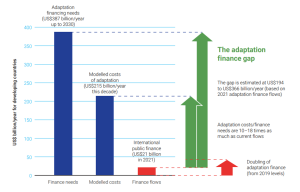
Adaptation Gap Report 2023 | UNEP – UN Environment Programme
However, despite this encouraging trend, adaptation finance remains just a small fraction of the total global climate finance pie. As climate change becomes increasingly difficult to both mitigate and adapt to, closing the global adaptation finance gap is crucial. CPI estimates that developing countries will need $212 billion USD annually up to 2030 to adapt to the rapidly changing climate, with African countries alone requiring at least USD $52 billion per year until 2030.
This underscores the urgent need for innovative financing instruments to support adaptation efforts. One promising solution is the use of green, social, and sustainability (GSS+) bonds that incorporate adaptation and resilience as eligible uses of proceeds (UoP). This market has seen rapid growth, with over 2500 GSS+ bonds with adaptation issued at a volume of just over USD $1 trillion since Sweden’s City of Gothenburg first included adaptation as an eligible UoP in its 2013 green bond issuance.
Cadlas recently conducted research into GSS+ bonds with adaptation UoP over the period 2013 to September 2024, using data from the Environmental Finance database. This examined trends in the volume of GSS+ bond issuances as well as the total number of issuances across various issuer types including sovereign, sub-sovereign (agency & municipal), corporates, financial institutions and supranational entities. Below is a brief breakdown of our major findings:
Global Trends
High-Income and Upper-Middle Income Countries:
Issuers in high and upper-middle income countries have mobilized over $620 billion from 1,657 bonds between 2013 and September 2024. Europe leads with over $430 billion from 557 bonds, while the Asia-Pacific (APAC) region follows with just over $110 billion from 383 bonds. North American issuers accounted for approximately 42% of the bonds issued in the region, but only mobilized about $70 billion in total. Municipal entities in the U.S. were responsible for nearly half of the total issuances, although their bond volumes were smaller compared to European sovereign issuances, which made up over 60% of that region’s volume.
Low-Income and Middle-Income Countries
In contrast, low and middle-income issuers have contributed 219 bonds valued at $72 billion. The APAC region stands out, accounting for over 60% of total bonds issued and 55% of the total volume. Latin America and the Caribbean (LAC) followed with nearly 20% of the volume, while Africa accounted for 13% of all issuances but only 4% of the volume, reflecting a predominance of smaller bond issuances in the region.
Regional Trends
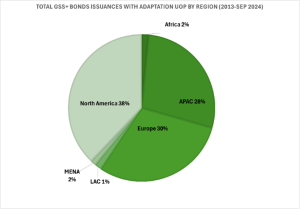
APAC:
The APAC region has mobilized over $140 billion from approximately 523 bonds. Countries like Japan, South Korea, Hong Kong, and Australia collectively accounted for nearly 70% of the bond issuances during this period.
Africa:
Africa saw just over $3 billion from 27 bonds, primarily driven by South African financial institutions, which made up 65% of the bond volumes.
Europe:
In Europe, Sweden, the United Kingdom, and France led in the number of bonds issued, with sovereign bonds accounting for 72% of the region’s total volume despite making up only 29% of total issuances.
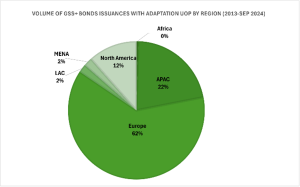
LAC:
Brazil dominated the LAC region, issuing 10 of the 28 bonds and generating the highest volume, while Colombia followed with 8 sovereign bonds.
MENA:
The MENA region’s landscape included 6 sovereign bonds and 16 issued by financial institutions, with the UAE leading in volume.
North America:
North American bond issuers accounted for approximately 712 bonds, generating over $80 billion in volume. The U.S. dominated in bond issuances, especially among municipal entities.
Conclusion
While adaptation finance still represents a small fraction of global climate finance, the growth of GSS+ bonds signify a positive trend in bridging this adaptation finance gap, particularly in developing countries. As awareness of climate resilience and its importance continues to grow, GSS+ bonds can become a vital instrument in mobilizing in adaptation initiatives.
Other Articles

Insights from Climate Bonds CONNECT 2024: Fostering Resilience in a Changing World
Insights from Climate Bonds CONNECT 2024: Fostering Resilience in a Changing World
From discussions about transition planning for corporates to the path to achieving interoperability and innovative models for scaling up finance for resilience, Climate Bonds CONNECT 2024 was filled with valuable insights and impactful discussion sessions around adaptation and resilience.
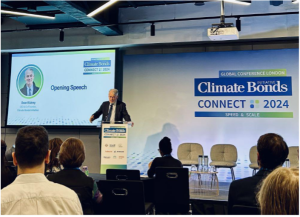
The jam-packed day began with Climate Bonds Initiative (CBI) CEO, Sean Kidney’s opening speech where he emphasized the need for global effort on building resilience to climate change given that it is a global challenge.Furthermore, efforts to avoid catastrophic climate change continue to be hindered by a range of crises, including socioeconomic inequality, health and food security concerns, all of which are exacerbated by climate change itself. These challenges require international cooperation and coordination, particularly around adaptation and resilience.
Mr. Kidney underscored this point by noting that climate change will adversely impact the planet irrespective of global progress on mitigation/decarbonisation. As a result, it is necessary now, more than ever to scale up action on adaptation and resilience. While the challenges around decarbonisation/mitigation are well documented this is not the case for resilience/adaptation. However, he noted that tools like CBI’s recently launched Climate Bonds Resilience Taxonomy, for which Cadlas served as the lead technical partner, provide important guidance and clarity on a range of urgent priorities for building resilience. In closing out his speech Mr. Kidney said that despite the enormity of the challenges surrounding climate change, he is still hopeful that we can work together to find a solution. He pointed out that “we are a hive species” intimating our need to work collectively to solve global challenges and cited the ‘green revolution’ and the role of technology as great opportunities.
Immediately following Mr. Kidney’s speech was Torsten Albrecht, Principal Investment Officer at the Asian Infrastructure Investment Bank (AIIB), who spoke about AIIB and the role of multilateral development banks (MDBs) in supporting the green, social and sustainable (GSS+) bonds market, particularly in emerging economies. He highlighted AIIB’s goal to achieve sustainable economic development through infrastructural projects and the bank’s work to actively scale up private sector participation in climate focused projects. Mr. Albrecht noted that despite the encouraging growth of the GSS+ bonds market in developed markets, there is still a sizeable finance gap and more focus should be placed on emerging markets to help close this gap. This was followed by session 1, a panel discussion on opportunities for corporates and countries around transition planning.
After a brief networking and coffee break, attendees were back in the plenary for session 2 on interoperability between taxonomies which was moderated by CBI’s Director of Thought Leadership, Anna Creed. There are over 45 national or regional taxonomies in existence across the globe, with more in development. While this is necessary given the range of geographical contexts and differing levels of development, it presents a significant reporting challenge to investors and regulators. Panellists highlighted the need for and importance of comparability, equivalence and disclosures in achieving interoperability between taxonomies. Following this was a networking lunch which preceded the second 5-minute OnSwitch session on the Asian Development Bank’s work in the GSS+ bonds market in Southeast Asia.
Immediately after this was what CEO Sean Kidney pointedly referred to as the most highly anticipated session of the day. Session 3 was entitled ‘Innovating for Resilience: Scaling-up Proven Models to Catalyze the $3 Trillion Opportunity’ and was moderated by CBI’s Director of Strategic Programmes, Ujala Qadir. Before jumping into the discussion, Ms. Qadir asked panellists to share how climate change has personally impacted their lives within the last year. Several panellists spoke about their experiences with increased rainfall, flooding, extreme heat, landslides and hurricanes which set the tone for the panel discussion and underscored the importance of adaptation and resilience. She noted that we already have solutions and the capital, but they needed to be repackaged to direct finance towards adaptation and resilience. Panellist Gerald Evelyn, Invesco’s Senior Client Portfolio Manager, cited the use of blended finance in driving institutional investment towards building resilience in the world’s most climate vulnerable regions. He noted that there has been significant interest from institutional investors in Invesco’s Climate Adaptation Action Fund.
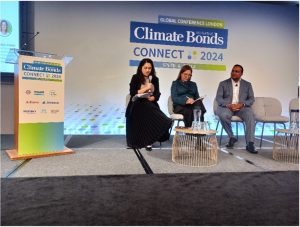 Lasitha Perera, the co-founder and CEO of the Development Guarantee Group, also highlighted the usefulness and opportunity guarantees provide, pointing out that “guarantees have mobilised the most private capital but are the most underused.” He noted that many adaptation and resilience investments, especially in emerging markets, sit in sub-investment grade countries. While simultaneously instilling confidence in investors, guarantees provide access to private finance for investees and countries that are often excluded because traditional institutional investors rely on ratings as an indicator of risk. The conversation then continued to the role of MDBs in scaling up finance for adaptation and resilience in which Xianfu Lu, Consultant on Adaptation and Climate Resilience at AIIB, noted that the capital is already there and MDBs already have several processes in place to track adaptation finance, but these efforts are hindered by a lack of “good projects in the pipeline.” In agreement with Ms. Lu, British International Investment (BII) Managing Director of Climate, Diversity and Advisory, Amal-Lee Amin, pointed out that while development finance institutions (DFIs) and MDBs can help build out the pipeline, governments needed to work on creating ‘enabling environments’ for project development. She also noted the importance of collaboration in managing risk and building capacity to scale up finance for resilience. Panellists also spoke about the importance of metrics for helping investors to understand and gain greater transparency around resilience issues and needs. In concluding the session, Ujala Qadir cited the usefulness of the Climate Bonds Resilience Taxonomy in helping investors to understand the impact of their investments on building resilience.
Lasitha Perera, the co-founder and CEO of the Development Guarantee Group, also highlighted the usefulness and opportunity guarantees provide, pointing out that “guarantees have mobilised the most private capital but are the most underused.” He noted that many adaptation and resilience investments, especially in emerging markets, sit in sub-investment grade countries. While simultaneously instilling confidence in investors, guarantees provide access to private finance for investees and countries that are often excluded because traditional institutional investors rely on ratings as an indicator of risk. The conversation then continued to the role of MDBs in scaling up finance for adaptation and resilience in which Xianfu Lu, Consultant on Adaptation and Climate Resilience at AIIB, noted that the capital is already there and MDBs already have several processes in place to track adaptation finance, but these efforts are hindered by a lack of “good projects in the pipeline.” In agreement with Ms. Lu, British International Investment (BII) Managing Director of Climate, Diversity and Advisory, Amal-Lee Amin, pointed out that while development finance institutions (DFIs) and MDBs can help build out the pipeline, governments needed to work on creating ‘enabling environments’ for project development. She also noted the importance of collaboration in managing risk and building capacity to scale up finance for resilience. Panellists also spoke about the importance of metrics for helping investors to understand and gain greater transparency around resilience issues and needs. In concluding the session, Ujala Qadir cited the usefulness of the Climate Bonds Resilience Taxonomy in helping investors to understand the impact of their investments on building resilience.
After this, the day continued with even more insightful sessions on the role of finance in advancing sustainable agriculture, the use of sustainable land bonds to finance nature-based carbon capture and storage as well as transparency and reporting in the GSS+ bonds market. In his spirited closing remarks, Sean Kidney invited attendees to share their own reflections on the day’s discussions and reiterated his hopefulness and excitement for the future.
Other Articles

Cadlas Newsletter: October 2024 Issue
Welcome to the Cadlas Newsletter!
Welcome to the first edition of the Cadlas Quarterly Newsletter! Each edition will provide valuable insights into the latest trends and developments in climate resilience finance, covering topics such as sustainable bonds, climate resilience taxonomies, and more. This newsletter is also an excellent way to stay up-to-date on the Cadlas team and our work!

The Launch of the Climate Bonds Resilience Taxonomy
The launch of the Climate Bonds Resilience Taxonomy (CBRT) in September 2024 marks a significant advancement in climate resilience financing.
This initiative provides a clear vocabulary for these investments, fostering collaboration among investors, issuers, regulators, and policymakers.
The CBRT builds upon Climate Bonds’ extensive experience of taxonomy development and extends their existing Climate Bonds Taxonomy into the increasingly urgent, but comparatively under-funded, area of climate resilience.
Cadlas is proud to be the Lead Technical Partner on this ground-breaking initiative, having worked closely with Climate Bonds since 2022 to bring in our extensive, practical experience of climate resilience financing.
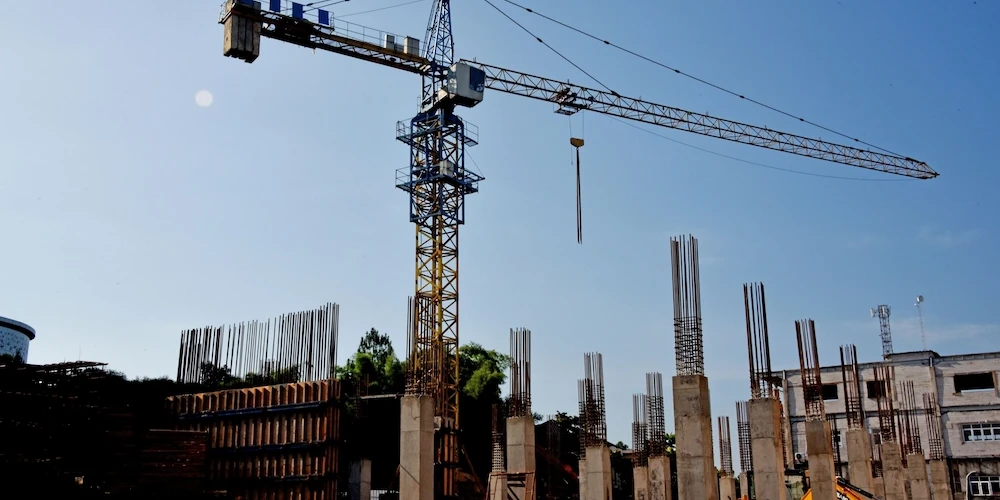
Climate Resilience and Sustainable Industrial Development: UNIDO’s Climate Adaptation Week
Cadlas CEO Craig Davies shared Cadlas’ perspectives on the role of the financial sector in supporting private sector action on climate adaptation as part of a Climate Adaptation Week organised by the United Nations Industrial Development Organisation (UNIDO) on 14-15 October. Building climate resilience is absolutely central to UNIDO’s core mission of inclusive and sustainable industrial development.
In addition to securing its own climate resilience, the industrial base also has a vital role to play in delivering the solutions and innovation that is urgently needed to build a climate-resilient economy at scale.

Cadlas Participation in the ADB CAIP Forum
Cadlas recently made significant contributions to the Asian Development Bank‘s Climate Adaptation Investment (CAIP) Forum in Manila, connected to our ongoing work with the ADB on this topic. Our Senior Specialist in Climate Resilience, Noah Wescombe, delivered a key presentation on climate resilience bonds, showcasing Cadlas’s role as the Lead Technical Partner in developing the Climate Bonds Resilience Taxonomy. This presentation marked a crucial step in connecting climate adaptation to tangible investment modalities, generating substantial interest among forum attendees.
In addition to presenting, Cadlas actively participated in technical discussions and led an investment planning clinic with the representatives of national Armenian delegations. This engagement provided valuable insights into structuring sustainability-linked loans and highlighted the necessary enabling environments for scaling such products. Cadlas’s involvement underscored our expertise in climate resilience financing and our commitment to advancing practical solutions for adaptation investments across diverse national contexts.

Cadlas Supports the GEF’s Climate Adaptation Innovation & Learning Project on Climate Change Adaptation Information Flows for the Financial Sector
The financial sector needs improved information on climate change adaptation to direct funds toward investments that enhance the real economy’s climate resilience.
Cadlas is delighted to be working alongside an impressive array of partner organisations including UNEP-FI, UNIDO, Climate-KIC and the Global Adaptation and Resilience Investment (GARI) group to implement this important GEF project. In particular, Cadlas is providing technical support to UNEP-FI on climate change adaptation impact measurement and information flows over 2024-25.
From the Insights Blog:

From discussions about transition planning to the challenges with achieving interoperability between taxonomies and innovative models for scaling up finance for resilience, Climate Bonds CONNECT 2024 was filled with valuable insights and impactful discussion sessions around adaptation and resilience.
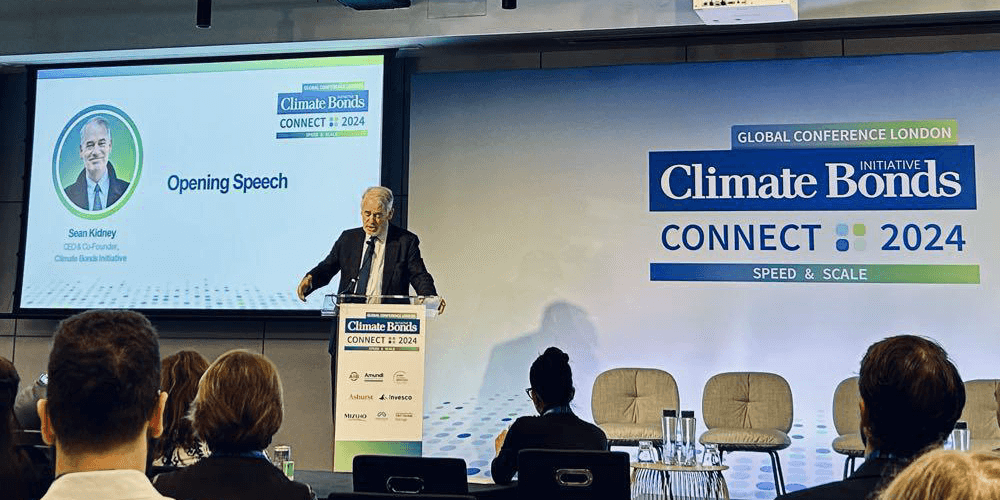
From discussions about transition planning to the challenges with achieving interoperability between taxonomies and innovative models for scaling up finance for resilience, Climate Bonds CONNECT 2024 was filled with valuable insights and impactful discussion sessions around adaptation and resilience.
Cadlas in the News:

In a recent interview with Environmental Finance, Cadlas CEO Craig Davies highlighted that while interest and momentum around adaptation-themed sustainable bonds is growing, significant investment opportunities are still being overlooked. Despite a substantial increase in bond issuances in recent years, actual allocations to adaptation and resilience investments remain low. In particular, he pointed out an almost pervasive misalignment between adaptation strategies and eligible investments at the sub-sovereign level within sustainable bond frameworks.
As investors continue to recognize the revenue-generating potential of these investments, Davies emphasized the need for a clear taxonomy to enhance market understanding of adaptation and resilience.

Cadlas CEO, Craig Davies, recently joined the Climate Proof podcast to discuss the current state of financial regulation related specifically to adaptation and whether targeted regulatory development could potentially help mobilities capital for adaptation.
Within the last decade, financial regulators across the globe have begun to enforce mandatory climate-related disclosures on companies and financial institutions including rules on “green funds” labelling. However, despite this increased regulatory action, adaptation and resilience have been largely neglected.

Find Us Here
Cadlas will be attending the Climate Financial Risk Forum (CFRF) adaptation working group launch in November 2024
Unlocking the potential of sustainable bonds for financing climate resilience: the Climate Bonds Resilience Taxonomy
Unlocking the potential of sustainable bonds for financing climate resilience: the Climate Bonds Resilience Taxonomy
Today has seen the launch of the Climate Bonds Resilience Taxonomy (CBRT) during New York Climate Week. This exciting development offers the potential to scale up market action on financing climate resilience (also referred to as adaptation) by providing clear and consistent definitions of climate resilience investments – in other words, a common vocabulary for climate resilience financing that can be used by broad range of stakeholders including investors, issuers, regulators and policymakers.
The CBRT builds upon Climate Bonds’ extensive experience of taxonomy development and extends their existing Climate Bonds Taxonomy into the increasingly urgent, but comparatively under-funded, area of climate resilience. Cadlas is pleased to be the Lead Technical Partner on this ground-breaking initiative, having worked closely with Climate Bonds since 2022 to bring in our extensive, practical experience of climate resilience financing.
The sustainable bonds market represents a significant source of financing for sustainable development, with total sustainable bond issuances now exceeding USD 5 trillion. However, only a small fraction of the capital raised through these issuances currently addresses climate resilience. While Climate Bonds’ analysis suggests that around 19% of labelled green bond issuances include climate resilience (or adaptation) as an eligible use of proceeds (UoP), evidence suggests that only a small fraction of this financing is being challenged into climate resilience investments.
Nonetheless, sustainable bonds are potentially a key instrument for mobilizing investment in climate resilience. Since the City of Gothenburg first included adaptation as an eligible UoP in its 2013 green bond issuance, market activity has progressively increased so that today around 2,500 sustainable bonds issuances have included adaptation as an eligible UoP, while a total volume of just over USD 1 trillion. While most of this activity has taken place in Europe, North America and the Asia-Pacific (APAC) region, there is a need for greater action in Africa, Latin America & the Caribbean (LAC), and the Middle East & North Africa (MENA) regions, where sustainable bond volumes with adaptation UoP remain relatively low despite these being some of the most climate-vulnerable regions of the world with significant climate resilience investment needs.
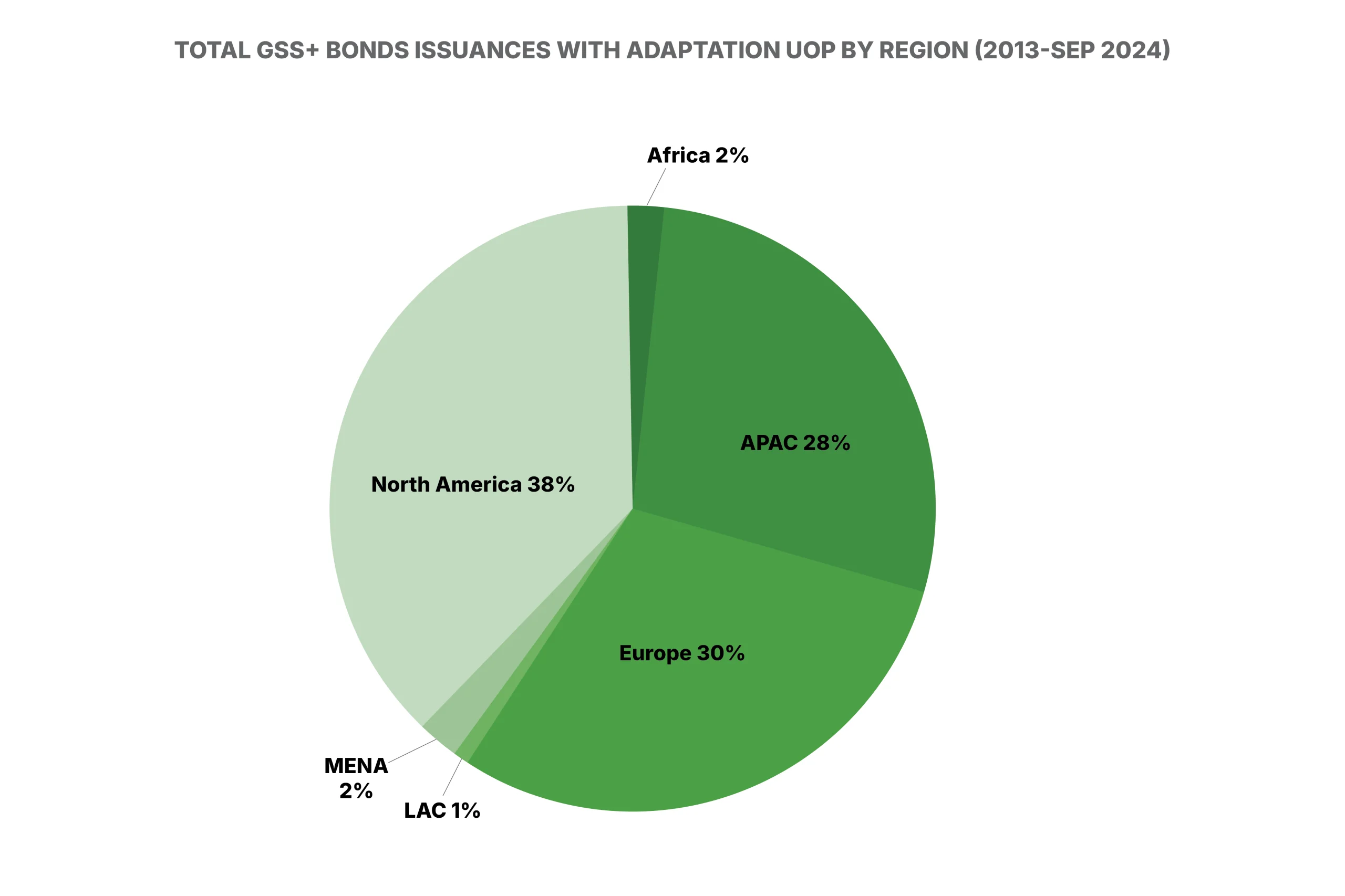
This highlights the need for much greater flows of financing for climate resilience, as the frequency and severity of climate change impacts – and their economic and human costs – continue to accelerate. For example, the United Nations estimates that developing countries need up to 18 times more adaptation finance than is currently provided. Furthermore, at present more than 98% of reported adaptation finance is provided by public institutions such as development finance institutions (DFIs), which highlights the need for much greater action on mobilising private finance for climate resilience.
An important obstacle to private finance mobilisation for climate resilience has been a lack of clarity on definitions and criteria for climate resilience investments. This creates uncertainty for both investors and issuers and hinders the flow of capital. While sustainable finance taxonomies can play an important role in directing private and public investments toward sustainability goals, they have hitherto not given due attention to climate resilience as an investment theme.
To date, climate resilience has tended to take a back seat to climate mitigation (or decarbonisation) objectives in sustainable finance taxonomies, with a lack of consistency in the sectoral coverage and breakdown of climate resilience financing. This has been compounded by process-based definitions that are difficult for users to apply, and a lack of clear eligibility criteria for determining whether an investment is meaningfully contributing to climate resilience.
The CBRT directly addresses these challenges by providing a credible classification system for climate resilience investments. It offers focused, detailed guidance on climate resilience, an area often under-prioritised or addressed only broadly in many existing taxonomies. The CBRT provides clear, consistent and comprehensive coverage of climate resilience investments based on six Climate Resilience Themes. This covers a broad range of investment types ranging from financing the adoption of specific climate resilience measures within investments to financing economic activities that provide A&R solutions.
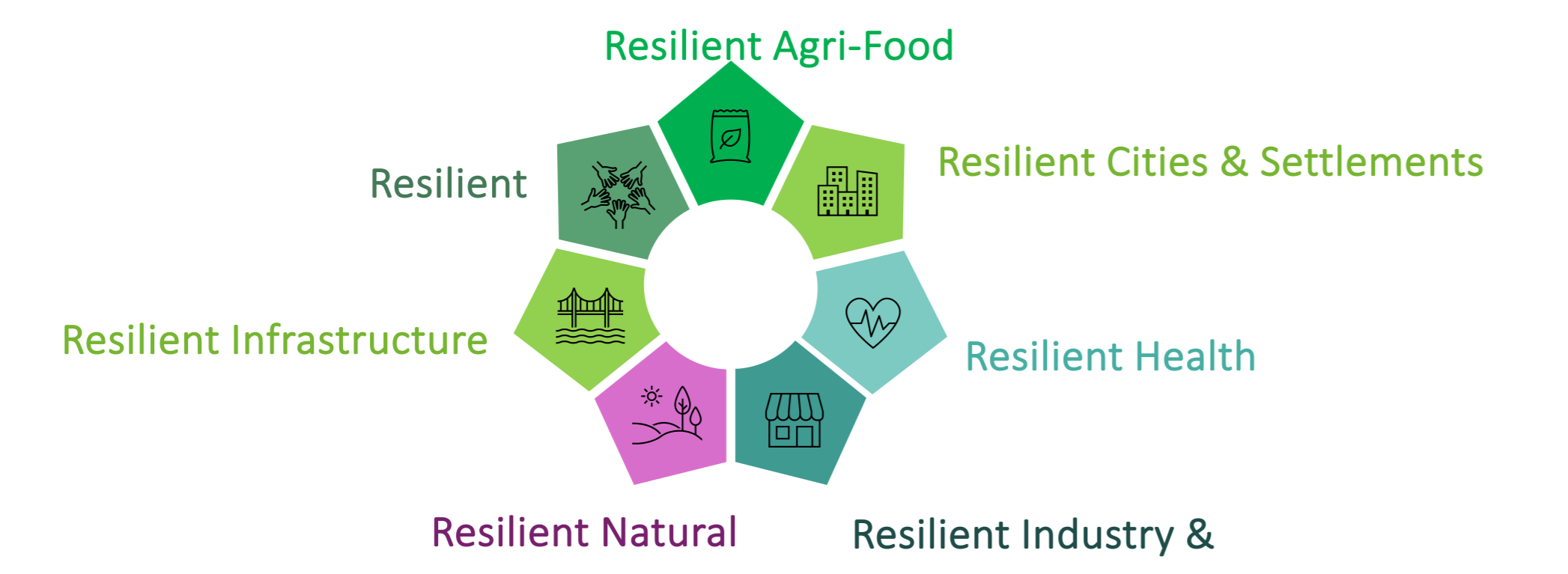
The CBRT fills a critical market need for a common foundation that helps investors identify and scale up finance for a wide range of investments that genuinely contribute to building climate resilience. It addresses three critical gaps:
- Clear, Science-Based Definitions and Criteria: The CBRT provides clear, science-based definitions and criteria for identifying investments that substantially contribute to climate resilience. This is essential for overcoming the lack of clarity that has hindered resilience finance flows to date.
- Navigating the Regulatory Landscape: The CBRT helps investors and companies navigate the evolving regulatory landscape. It aligns with and advances beyond regulatory standards like the EU Sustainable Finance Taxonomy, providing a rigorous, globally applicable framework for demonstrating the climate resilience credentials of investments.
- Flexibility and Adaptability: The CBRT has been designed to be flexible and adaptable to diverse country contexts and investor needs. This is crucial for building resilience, which requires tailored approaches that reflect local vulnerabilities and priorities. The format of the CBRT also allows for further improvements and tailoring to be added over time.
The next exciting chapter in the CBRT story begins now, as it begins to be taken up and put to use by issuers, investors, regulators, policymakers and others. The CBRT will not only enhance transparency for investors by eliminating certain information asymmetries but also support the alignment of global capital flows with local resilience needs and opportunities underpinned by rigorous, science-based eligibility criteria.
As Cadlas continues to collaborate with partners across the finance landscape to enhance resilience financing in various country contexts and investor mandates, we are confident in the CBRT’s applicability across multiple use cases – particularly as it relates to the sustainable debt market. By supporting a range of issuers, investors and other participants in applying and using the CBRT, we can enhance the effectiveness and impact of climate resilience investments, driving more capital towards projects that are crucial for adapting to and mitigating the effects of climate change.
Cadlas is committed to fostering a resilient future by enabling more informed and impactful investments in climate adaptation and resilience. Stay tuned for more updates on how the CBRT is set to transform the landscape of climate finance.
Other Articles

Basing investment decisions on climate adaptation and resilience impact
Basing investment decisions on climate adaptation and resilience impact
As investors become increasingly aware of the implications of our changing climate, there is a growing need for more information about the positive adaptation & resilience impacts of investments.
Private investors are increasingly aware of emerging investment opportunities in adaptation & resilience, with the Bank of America forecasting that the global market for adaptation & resilience may reach USD 2 trillion by the middle of this decade, and MSCI estimating that 11% of publicly listed companies deliver products and services that contribute towards adaptation & resilience.
Information about the positive adaptation & resilience impacts of investments can help to engage private investors and mobilise finance for urgently needed investments in adaptation & resilience.
But private investment in adaptation & resilience is held back by a lack of clear, practical and investor-relevant adaptation & resilience metrics that investors can use to identify, appraise and prioritise investments that make meaningful contributions towards adaptation & resilience.
Therefore Cadlas is pleased to have worked with the Adaptation & Resilience Investors Collaborative (ARIC) and the United Nations Environment Programme Finance Initiative (UNEP-FI) to develop guidance for investors on the assessment of adaptation and resilience impact in private investments. This guidance, which is available here, sets out a practical framework for assessing adaptation and resilience impact across a broad range of investments using a set of clear, consistent and investor-relevant metrics.
Other Articles

Assessing adaptation & resilience impact in private investments: new guidance for investors
Assessing adaptation & resilience impact in private investments: new guidance for investors
Cadlas is pleased to have provided technical support to the Adaptation & Resilience Investors Collaborative (ARIC) for the development of a framework for assessing the positive impact of private investments towards climate adaptation and climate resilience goals.
This leverages the experience of impact investing to set out a clear framework to help investors measure and manage the way that their investments contribute towards adaptation and resilience.
As private investors become more aware of the scope for investment in adaptation & resilience interventions and solutions, there is an increasing need for meaningful and consistent information about the positive contributions of those investments towards the climate resilience of people, the planet and the economy.
For further details, read the full report which is available on the ARIC webpage: Adaptation & Resilience Impact: A measurement framework for investors
Other Articles














